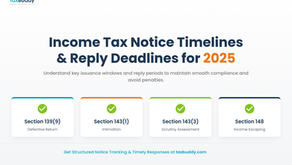top of page
One stop for everything related to taxes,
Our Blogs
The latest industry news, interviews, and resources


How to Update Communication Address in Your ITR Profile
Updating the communication address in an Income Tax profile is essential for ensuring every notice, refund update, and official correspondence reaches the correct location. The Income Tax Department sends critical updates through email, SMS, and postal communication, making it necessary for taxpayers to maintain accurate profile details on the e-filing portal. The update takes only a few minutes and prevents missed deadlines or compliance issues. The process follows a simple

Asharam Swain
Dec 17, 20259 min read
Section 89 Relief for Salary Arrears: Calculation & Filing Process
When salary arrears are paid in a lump sum, the sudden jump in income often pushes a taxpayer into a higher tax slab, resulting in an unfair tax burden. Section 89 of the Income Tax Act helps correct this imbalance by allowing tax relief on arrears and advance salary through a year-wise comparison of tax liability. The provision ensures that income meant for earlier years is not taxed at today’s higher rates. With many employers issuing arrears after pay revisions or settleme

PRITI SIRDESHMUKH
Dec 17, 20258 min read
Section 115BAC New Tax Regime: Deductions, Rebate & Tax-Free Income Explained
Section 115BAC forms the core of India’s new tax regime, designed to simplify taxation by offering lower slab rates in exchange for fewer deductions. Recent updates under the Union Budget FY 2025-26 have significantly changed how taxpayers calculate benefits, especially around the higher standard deduction of ₹75,000 and the increased Section 87A rebate of up to ₹60,000. These changes push the effective tax-free income threshold to ₹12.75 lakh for salaried individuals and pe

Asharam Swain
Dec 17, 20258 min read


Income Tax Notice Timelines and Reply Deadlines for 2025
Income tax notices operate on specific statutory timelines, and understanding these timelines helps maintain smooth compliance throughout the 2025 cycle. Every notice issued by the Income Tax Department follows a defined window for issuance and a fixed reply period for taxpayers. These timelines depend on the type of assessment, the financial year involved, and the nature of discrepancies identified in the filed return. With the 2025 assessment cycle seeing structured updates

Rajesh Kumar Kar
Dec 17, 20259 min read
Can You Claim Rent Deduction Without Landlord’s PAN?
Rent deduction under House Rent Allowance (HRA) often hinges on one critical detail: the landlord’s PAN. Tax rules link HRA eligibility to proper documentation, and PAN becomes relevant when annual rent crosses a specific threshold. Most salaried individuals face confusion about when the PAN requirement applies, how to claim HRA without it, and what to do if the landlord does not hold a PAN or refuses to provide one. Clear guidelines exist within the Income Tax Act to help d

Dipali Waghmode
Dec 17, 20258 min read
How to Claim Foreign Tax Credit for Income Earned Abroad
Foreign Tax Credit allows resident taxpayers in India to avoid double taxation on income earned abroad by offsetting tax already paid in another country. The process requires accurate reporting of foreign income, filing Form 67 , and submitting supporting evidence before filing the return . Income earned outside India must be declared in Schedule FSI and Schedule TR to compute the eligible credit under Indian tax rules. Each country’s tax payment is evaluated separately, and

Rashmita Choudhary
Dec 17, 20259 min read


ITR Processed but Refund Not Issued: What’s Next
When an Income Tax Return shows the status “Processed” but the refund still hasn’t arrived, it usually means the tax department has completed verification and computed the refund, but the credit has not reached the bank account. This delay often arises from incorrect bank details, a mismatch in tax records, or pending verification at the Centralised Processing Centre. Refunds can also be held up due to a failed transaction at the bank’s end, even when everything appears corre

Nimisha Panda
Dec 16, 20258 min read


How to Track Rectification Request Status on Income Tax Portal
Tracking a rectification request on the Income Tax Portal has become significantly easier after the 2025 system enhancements that now allow both CPC-processed and AO-processed rectifications to be monitored online. The portal displays real-time updates regarding errors corrected under Section 154 of the Income Tax Act, 1961, ensuring clarity on whether a request is submitted, in progress, completed, or rejected. With the upgraded dashboard and streamlined navigation, taxpaye

Asharam Swain
Dec 16, 20258 min read


Refund Processed But Amount Is Incorrect: Steps to Rectify
Refund mismatches occur when the amount credited by the Income Tax Department does not align with the refund shown in the processed ITR. This usually happens due to errors in TDS claims, mismatches in Form 26AS or AIS, adjustments against outstanding dues, or mistakes in computation made during processing under Section 143(1) . The issue can be corrected through a structured rectification process on the Income Tax Portal, ensuring the correct refund is reissued. Platforms lik

Rajesh Kumar Kar
Dec 16, 20259 min read


Can You File an Updated Return After an Assessment Order?
Filing an updated or revised return after an assessment order often raises confusion because the timelines and restrictions under the Income Tax Act are strict. Once an assessment order is completed, the law does not permit filing a revised or updated return for that year. Taxpayers are instead required to rely on rectification options if any error comes to light post-assessment. Understanding these boundaries is essential to avoid invalid filings and unnecessary disputes. Pl

PRITI SIRDESHMUKH
Dec 16, 20258 min read
bottom of page